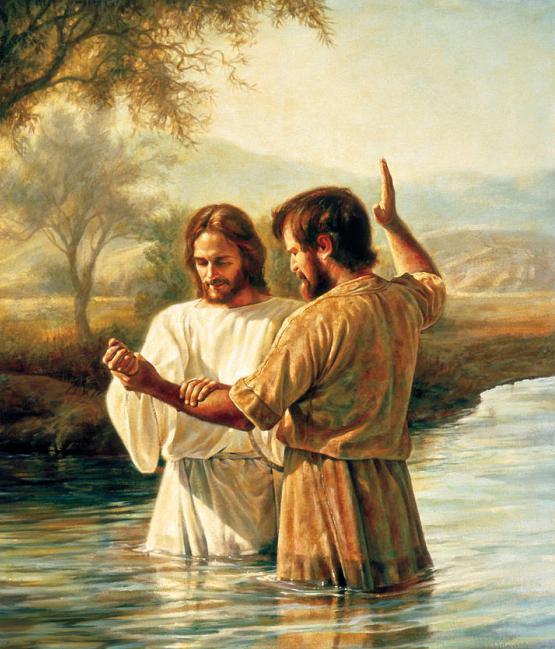Orthodoxy in Russia laid the foundation for many traditions and customs, which even in isolation from their religious significance are popular and actually live their own lives as independent phenomena of Russian culture. A vivid example of such phenomena is the feast of Baptism. It has always been celebrated in Russia since the century, that is, since the adoption of Christianity in the Principality of Kiev. What is the Baptism of the Lord?
Epiphany in the church and among the people
The Baptism of the Lord is a holiday on which, according to Christian beliefs, Jesus Christ was ritually washed in the Jordan River . In the framework of Christian theology, this is of particular importance for the atonement and salvation of mankind from the slavery of sin and death - Christ, having been baptized, took upon himself the whole burden of human sins, which he then offered to the cross, having atoned for them with his blood. But these theological constructions have nothing to do with the folk customs of Baptism, and those, in turn, are least oriented towards the sacred meaning of the holiday. In public memory, this day is strongly associated with frost, ice holes and mass bathing in ice water, when, under loud congratulations on the Baptism of the Lord, beautiful and solemn prayers open the “bathing season”. For many, plunging into cold water on this day is a matter of honor, regardless of religious beliefs and the availability of such in principle. And those who have not yet completely lost touch with church tradition are also stocking up in Baptism with great agiasma - baptismal holy water, a special rite consecrated in churches on this day. It is believed that this water is literally imperishable - it does not deteriorate and does not bloom and can be stored for a long time without harm. It’s also traditionally accepted at this time, congratulating each other, to give the cards “With the Baptism of the Lord”.

Christ Baptism Events
As already mentioned, the occasion for the festivities is the baptism of Christ. According to the gospels, this was before Jesus embarked on the path of preaching. Guided by God, he went to Jordan, where he lived and taught a Jewish prophet named John. His nickname was “The Baptist,” because he baptized repentant sinners by immersion in the flowing waters of the Jordan. According to church traditions, when Jesus asked John for baptism, he tried to stop him, considering himself unworthy to baptize the messiah. Nevertheless, he obeyed, and at the moment when Christ came out of the water, the sky opened, and the Holy Spirit descended upon the newly baptized one, and the divine voice proclaimed that Jesus was the beloved Son of the Most High, who should be obeyed.
It is difficult to say how much these descriptions correspond to real events. However, it was this version that became official in church orthodoxy and later gave rise to a special day that we know today as the feast of the Baptism of the Lord.
Birthday party
Initially, however, Christians, although they believed in this story, did not have special observational dates to recall the baptism of Jesus. What is the Baptism of the Lord for early Christians? Just a fact of the biography of their teacher. At the dawn of Christianity, the followers of Jesus were little interested in his earthly life, they were interested in his supernatural essence. Therefore, they only celebrated Easter - the resurrection of Christ from the dead. For the first time, the holiday of the Epiphany began to be celebrated by groups of Egyptian Gnostics, who developed special rites for this day, however, they are little known now. We only know that they specially blessed the water in the Nile River, correlating this somehow with the fact of the baptism of Christ. The Orthodox, however, borrowed this practice from the Gnostics, as is now believed, for polemical purposes, contrasting their “true” sanctification with the Gnostic “heretical”. But this late interpretation of the fact of ritual plagiarism is not very plausible. Most likely, the Baptism of the Lord itself, the traditions of its celebration, as well as theological interpretation, moved from Gnosticism to Orthodoxy due to the fact that these two branches of Christianity at that time in Egypt were ideologically much closer to each other than now. There is every reason to believe that in the ranks of the Orthodox communities of Egypt there were enough phylognostics and even frankly gnostic members, so such an exchange of rituals and ideas is not special and unique. After all, the Gnostics gave Orthodoxy not only the Baptism of the Lord - the traditions of icon veneration, the worship of Sophia, monasticism and some other things are also rooted in “heretical” Gnosticism.

Early tradition of celebrating the baptism of Christ
In the first centuries of Christianity, the feast of the Baptism of Jesus did not have its own date on the calendar. The fact is that it is not known in reality on which day this event occurred. Based on the fact of the appearance of the Holy Spirit and the voice of God the Father, Christians understood this event as a manifestation of God and began to celebrate it with Christmas and the visit of the sorcerers to the holy family as a single holiday. This happened on the grounds that the Orthodox believe in the divinity of Christ, that is, in God himself appeared on earth in Jesus. Therefore, the festival was called, connecting Christmas, the worship of the Magi and the Baptism of the Lord - the Epiphany. So it is now called according to historical tradition. The Epiphany was celebrated on January 6th.
Tradition development
After the Ecumenical Council in 451 in Chalcedon, the dates of the celebration of these events were delimited in time. Christmas was attributed to December 25, and on January 6 they staked out under the Epiphany. The traditions and customs of different churches, however, began to change over time and therefore today there are three different practices for celebrating this event. Another - extremely Protestant - does not celebrate Baptism at all.
Ancient Eastern tradition
In churches that have not adopted the decrees of the Council of Chalcedon and remained independent in their administrative, theological and liturgical life, the tradition of celebrating the Epiphany on January 6 along with Christmas under the single name "Epiphany" is still preserved. Therefore, they even in Russia do not congratulate each other and do not give the cards “With the Baptism of the Lord”, preferring to talk about one fact of the appearance of the Lord, expressed immediately in different events. The only difference is the Coptic Church, which celebrates the Epiphany not on January 6, but on January 7.
Roman catholic tradition
In the Latin Catholic tradition subsequent to the Council of Chalcedon, Christmas is celebrated not on January 6, but on December 25. The truth and Baptism itself has shifted from the original date on which Catholics now recall the visit of the Magi and their worship of Christ. Actually, the Baptism of the Lord in pre-reform Catholicism occurred on January 13, that is, a week after visiting stargazers. The situation has changed somewhat after the Second Vatican Council. Today, congratulations on the Baptism of the Lord, beautiful rituals of the consecration of water and a festive mass, the Latin tradition requires to arrange on the first Sunday after January 6. Thus, a single holiday in the western church fell into three separate.
Greek Orthodox tradition
What is the baptism of the Lord for the Orthodox? As for Catholics, this is primarily a fact of the baptism of Christ - something that the followers of the ancient Eastern churches do not want to emphasize, focusing only on the internal component of the event. In the Orthodox churches of the Greek, that is, Byzantine, tradition, the 451 decree is invariably observed. Therefore, Baptism is celebrated on January 6, though according to the New Julian calendar, which today duplicates the Gregorian.
Russian Orthodox tradition
The Russian Orthodox Church, together with three other Orthodox Autocephalous churches, represents a special tradition of celebration, still adhering to the Julian calendar in its liturgical practice , which is almost two weeks behind the Gregorian one. Therefore, what is the Baptism of the Lord in Russia is remembered only on January 19, when the rest of the Christian world is already preparing to celebrate another event in the life of Jesus Christ - Circumcision.
As noted above, the Russian Church is not alone in its conservatism. In fidelity to the old style, it is supported by the Jerusalem, Serbian and Georgian Orthodox churches, as well as the monastic republic on Mount Athos. In addition, outside the canonical borders of the so-called family of Byzantine churches, there are several independent Orthodox jurisdictions, which also focus on the Julian calendar in liturgical practice. The greatest weight among them is the group of old-style churches of Greece, characterized by extreme conservatism.